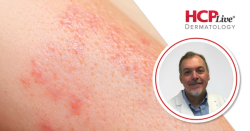Personalizing Treatment Selection in Atopic Dermatitis - Episode 12
Treatment Goals in AD
Matthew Zirwas, MD, shares goals of therapy for a patient with AD.
Raj Chovatiya, MD, PhD: I want to transition to our third and final case here and use the bulk of our time to take a deeper dive into safety and monitoring, which we’ve already started to do well here. I think that is going to be, and correct me if I’m wrong, the biggest sticking point for many folks who might necessarily not be ones who want to try something new, especially something that has a boxed warning. Knowing that many of our drugs out there that have been used for many years, whether it be tacrolimus or others that have boxed warnings, have not really done that much to impact use in the long run. I’ll ask you, Matt, what are your goals for treatment when you’re working with someone, let’s say the mythical moderate patient? When they don’t have that much body surface area where a systemic treatment makes sense, but they’re hovering around that 10% to 20% range, where a topical could be reasonable, but perhaps you are thinking a systemic as well. What are your goals here?
Matthew Zirwas, MD: I’m a believer in the 1 question summary. I’m going to walk in the room and say, “How is your eczema doing?” And they’re going to say, “It’s doing great.” That’s my goal. If their answer is anything other than that, then I’m not at my goal. I might be at my goal if they say, “It’s going pretty good.” Then I’m more likely going to ask things like, “Ok, we’re doing pretty good. How often are you putting the topical on? Is it keeping you up at night? Are you losing any sleep because of your eczema?” That’s really my goal. Whenever we talk about a patient who is not adequately controlled by topical prescription therapy, to me, adequately controlled means you put the medication on intermittently, you then go significant periods of time without having to use prescription topicals, and then the disease, whenever it relapses, the topicals work quickly and effectively.
For somebody who’s having to put topical steroid medication on every day to maintain a low level of disease activity, or even if they’re using topical ruxolitinib, and they’re having to use it every day and they’re still having active disease, to me, even if their active disease isn’t that bad, if it’s enough that they say, “It’s there, it’s kind of bothering me,” that’s not adequately controlled. I’ve got a bit of neck dermatitis right now because I upped the strength of my retinol, and so I’m experiencing a little itch the last couple of days, and I’m like, “Jeez.” So, then I think about my poor patients, and I’m like, “I really need to make sure I get these people feeling really good.” That’s my goal, for me to walk in the door and the conversation go, “How’s your eczema doing?” “My eczema’s doing great.” That is my goal.
Transcript edited for clarity



